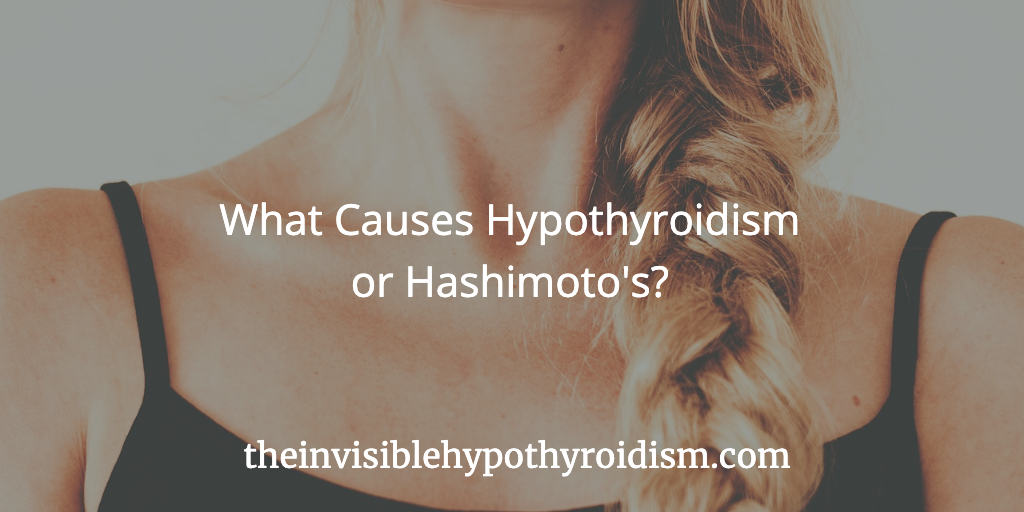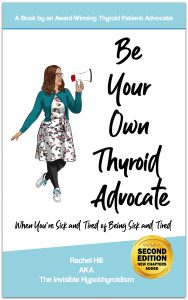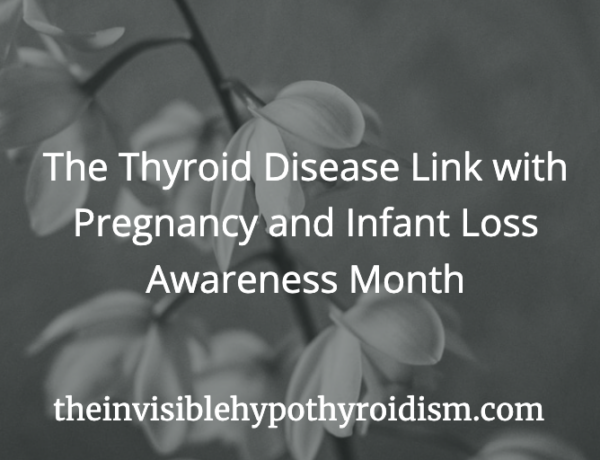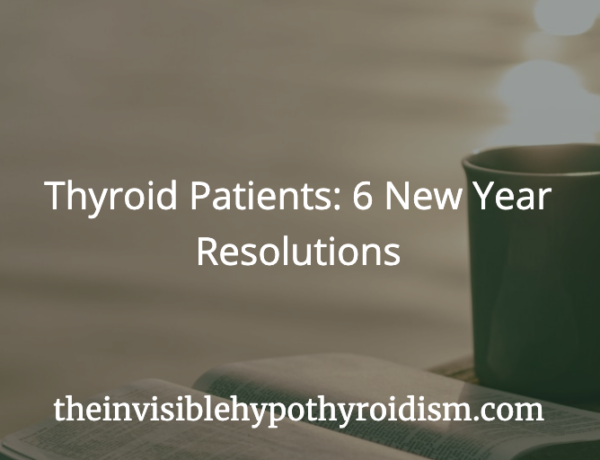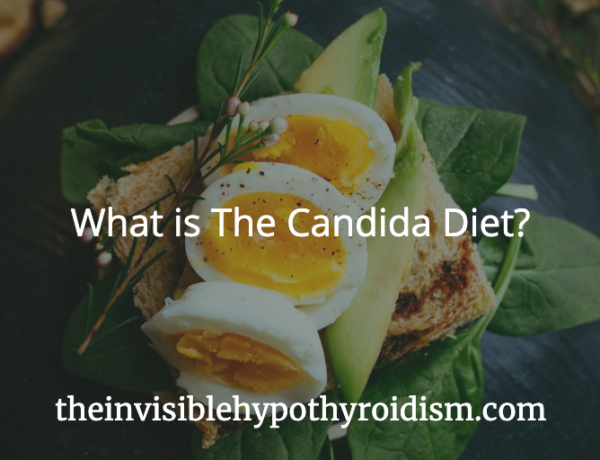Originally published on 12th June 2016 Last updated on 11th March 2024
You may have wondered what caused your thyroid condition.
Could it be one of the below?
1. Autoimmune Disease
Most commonly, Hashimoto’s Thyroiditis is the cause for hypothyroidism. This autoimmune disease is said to cause around 90% of hypothyroidism cases. [1]
You might not even know you have it as many of us aren’t formally diagnosed.
It can be tested for by completing thyroid antibody tests Thyroid Peroxidase Antibodies and Thyroglobulin Antibodies. Results over range in these diagnose Hashimoto’s. You can order these tests online here and here.
Hashimoto’s causes the immune system to attack the thyroid gland, slowly destroying it, affecting its ability to function correctly, thus causing hypothyroidism.
It is believed that those of us carrying the genetic makeup to develop Hashimoto’s, trigger the condition by switching it ‘on’.
The trigger for Hashimoto’s (and thus, hypothyroidism – if you have both, as 90% of us do) can be various things, such as:
- Stress / adrenal dysfunction
- Puberty
- Hormonal Shifts; Pregnancy, postpartum, menopause, perimenopause, hormonal contraceptives (starting them or coming off them)
- Iodine deficiency or excess iodine
- A blow to the immune system such as severe illness or viruses
It is most often a combination of triggers that make the perfect storm. If something causes a big enough stress to the body, it can be a contributing trigger. There is no one cause or trigger for everyone, and what’s more, we can all experience a different combination of unfortunate things that all contribute towards triggering the onset of a thyroid condition.
For example, a common combination can be the menopause or postpartum peroid, poor gut health, plus mental or emotional stress such as work stress, grief or family fall-outs.
What we know so far is that there is a combination of genetic susceptibility plus environmental triggers, such as hormonal changes, excess iodine, viruses and stress.
For myself, it was physical stress in the form of pneumonia which put me in the ICU, plus extreme mental and emotional stress, poor sleep, poor food habits, overexertion and puberty or hormonal changes (I was 18 years old).
A lot of the other things mentioned further on in this article may also trigger Hashimoto’s…
- Food sensitivities (allergies, sensitivities and intolerances are more common in people with autoimmune disease, but we are unsure if that equals a cause or not)
- Poor gut health
- Viral infections
- Mold exposure
- Low iron levels / Nutrient and Vitamin deficiencies (Iron, B12, D, selenium)
- Chronic inflammation
- Blood sugar imbalances
- Toxicity exposure
Related Articles: What is the Difference Between Hypothyroidism and Hashimoto’s? and Why It’s Important to Know if You Have Hashimoto’s
2. Genetics
The thyroid may not develop properly at birth, known as congenital hypothyroidism.
This is a condition resulting from an absent or underdeveloped thyroid gland, or one that has developed but cannot make enough thyroid hormone, making the infant hypothyroid.
The British Thyroid Foundation estimates that 1 child in every 3,500-4,000 is born with hypothyroidism in the UK.
The thyroid gland may also fail later in life, which is more common. Dr Barry Durrant-Peatfield describes this as it being ‘programmed to fail’. This essentially means that it is a ticking time-bomb as to when it will start to struggle, but that you were always going to develop hypothyroidism.You may notice a pattern in your family such as signs of the condition starting in the 20’s or at middle-aged.
Excess iron, a condition called Haemochromatosis, is also a possibility for causing hypothyroidism. Dr Barry Durrant-Peatfield covers this theory in his book also. This condition can do damage to the endocrine system, which the thyroid is a part of.
3. Down Syndrome
It appears that having Down Syndrome increases the risk of having accompanying hypothyroidism, and primarily the autoimmune version. [3]
4. The Environment
Chlorine, Fluorine and Mercury (often found in dental fillings) have been said to cause hypothyroidism.
Mercury can affect selenium levels, and selenium is vital to thyroid function. If you think your dental amalgams may be contributing to your thyroid problems, then you should definitely discuss this with your dentist.
Caffeine, tobacco and alcohol may also have a negative effect on the thyroid. Tea also contains fluoride. Fluoride can displace iodine in thyroid compounds, so may cause conversion problems in high amounts.
Goitrogenic and soy foods may suppress thyroid function, though likely wouldn’t cause hypothyroidism unless eaten excessively.
Deficiencies in certain vitamins, minerals and nutrients can also lead to hypothyroidism. Iodine is a well-recognised one, as adequate Iodine is needed for proper thyroid function. Supplementing Iodine is controversial however, as many sources say to only supplement if you definitely need it. Supplementing it when you are not low could cause more problems.
5. Contraceptive Pill
Dr Kharrazian is one source who states that too much oestrogen, sometimes caused by the contraceptive pill or pregnancy, can cause hypothyroidism. Dr Jolene Brighten also covers the many ways in which hormonal contraceptives can lead to poor thyroid health.
I struggled a lot with heavy, painful and disruptive periods. The doctors proceeded to put me on the contraceptive pill to help this, which it did to a certain extent, but being on the pill and my undiagnosed thyroid problem led to monthly, debilitating hormonal migraines, and some doctors, including Datis Kharrazian and Dr Jolene Brighten, believe that the contraceptive pill can cause or trigger hypothyroidism, due to excess oestrogen.
6. The Menopause
Thyroid problems are known to surface at periods of hormonal stress, like pregnancy, and are more common just before the start of, or during, the menopause.
7. Gq/11
G1 proteins, the most important being Gq/11, switch thyroid processes on and off, particularly the activity of T3, the most active thyroid hormone.
If thyroid hormone levels are low, the hypothalamus produces TRH, which tells the pituitary to produce TSH, which in turn tells the thyroid to produce hormones T3 and T4. This is explained here.
The T3 stimulates the production of Gq/11, which reduces the activity of T3 in the cell, until blood levels have normalised.
This is what’s supposed to happen. However, there can be abnormal and over activity of Gq/11, which shuts down thyroid activity, but it often does not show up on blood tests, especially TSH testing. Durrant-Peatfield’s book explains this in detail.
8. Trauma To The Thyroid
Direct damage such as whiplash or hitting your chin on the dashboard in a car accident have been considered to cause hypothyroidism.
9. Adrenal Dysfunction
I’ve already covered a lot that adrenal dysfunction tends to come hand in hand with thyroid problems. A failing thyroid, often coupled with T4-only medicine that doesn’t help, can cause the adrenals to become stressed and fatigued. This is what happened to me.
But what if you had adrenal fatigue first, that caused or encouraged hypothyroidism? What if the adrenal system is damaged in such a way as to interfere with thyroid function and hormone uptake? Things like chronic emotional, physical and mental stress can cause the adrenals to dysfunction.
We already know that adrenal fatigue can cause thyroid medication to not work as well as it should.
10. Radioactive Iodine Therapy
A treatment often used for hyperthyroidism (an overactive thyroid), results in hypothyroidism, when the thyroid is permanently disabled from working at all or working a smaller amount than it used to. It can also shrink the size of goitres.
Radiation therapy to the neck area, such as when treating certain cancers, like lymphoma, can also lead to hypothyroidism. Radiation can damage thyroid cells, which can make it more difficult for the thyroid to produce thyroid hormones.
11. Surgery
Having a major operation such as a gall bladder removal or hysterectomy is discussed in Durrant-Peatfield’s book as possibilities for inducing hypothyroidism. It’s believed that they can affect thyroid function, post-op.
Surgery to remove the thyroid will obviously lead to hypothyroidism (a thyroidectomy). If only part of the thyroid is removed, the remaining gland may still be able to produce enough thyroid hormone alone, but commonly doesn’t, so thyroid hormone replacement medication for life is needed.
12. Pregnancy
A common one, pregnancy can be stressful on the body, also causing shifts in hormone levels and thus inducing hypothyroidism and/or trigger Hashimoto’s.
Some doctors estimate that as many as five to ten percent of women develop a thyroid problem after delivery. For some women, this starts during pregnancy, but it’s after pregnancy that many are diagnosed. Some recover after a month or two, but many are left with hypothyroidism for the rest of their lives.
Postnatal depression could be due to deficient thyroid function, so if you have been told you have postnatal depression, it is definitely worth having a full thyroid panel done to check your thyroid. Often a low Free T3 reading is the culprit.
11. Pituitary Gland Issues
Although rare, if something is wrong with the pituitary gland, this can interfere with the production of thyroid hormones.
The pituitary gland produces TSH, which tells the thyroid gland how much thyroid hormone it should make and release. If something is wrong with this, then thyroid hormone production and release will be wrong too, causing hypothyroidism.
A similar problem can be of the hypothalamus too. Although rare too, hypothyroidism can occur if the hypothalamus, situated in the brain, does not produce enough TRH, which tells the pituitary to release TSH.
12. De Quervain’s (Subacute) Thyroiditis
This is a painful swelling of the thyroid gland thought to be triggered by a viral infection, such as the mumps or flu. It’s most commonly seen in women aged twenty to fifty years old.
You can click on the hyperlinks in the above post to learn more and see references to information given.
Do you know what caused your thyroid condition?
See also:
The book Be Your Own Thyroid Advocate: When You’re Sick and Tired of Being Sick and Tired, which builds on this article in detail.
Related Articles:
14 Missed Signs of My Thyroid Condition Before I Was Diagnosed
References:
[1] https://www.ncbi.nlm.nih.gov/pubmed/3066320
[2] https://drbrighten.com/birth-control-thyroid-connection/
[3] https://www.ncbi.nlm.nih.gov/pmc/articles/PMC2683266/

